Wed, Mar 25, 2009
Meet the BOSS... the Air National Guard's prototypical effort to
develop a KC-135 Boom Operator Simulation System. Designed to
provide "a high fidelity, fully DMO (Distributed Mission
Operations) capable squadron level boom operator simulator for
KC-135 squadrons," this is a collaborative effort designed to
maximize training capabilities while (at the same time) minimizing
the costlier aspects of keeping KC135 "Boomers" trained on their
equipment and many different types of aircraft they may be asked to
interact with.
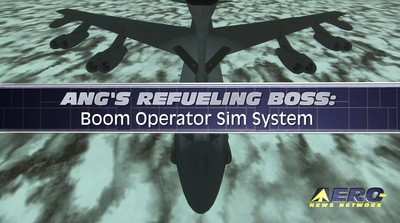
The BOSS is a low cost, squadron-level KC-135 simulator that
began prototype integration recently and is being fielded with an
estimated requirement for 17 devices. The Air National Guard
program uses four Christie Mirage HD 3D stereo DLP projectors
offering a projected 3D image that gives the boom operator
'true-to-life depth of perception that could otherwise only be
experienced in an actual aircraft.' The 3D BOSS is the first of its
kind, using active stereoscopic technology that specifically
addresses a boom operator’s critical need for precision,
mobility and hi-fidelity depth of field.
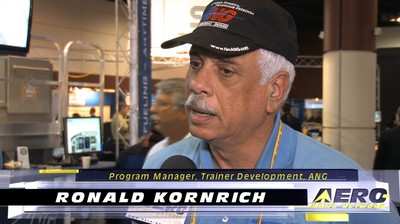
Designed to specifically support the ANG's the KC-135
Stratotanker fleet, these sim programs are devoted to filling
training requirments for a vehicle that has provided the core
aerial refueling capability for the Air Force/ANG and has excelled
in this role for more than 50 years. The KC-135 provides aerial
refueling support to Air Force, Navy and Marine Corps and allied
nation aircraft. The KC-135 is also capable of transporting litter
and ambulatory patients using patient support pallets during
aeromedical evacuations.
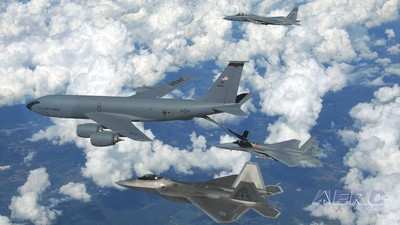
Four turbofans, mounted under 35-degree swept wings, power the
KC-135 to takeoffs at gross weights up to 322,500 pounds. Nearly
all internal fuel can be pumped through the flying boom, the
KC-135's primary fuel transfer method. A special shuttlecock-shaped
drogue, attached to and trailing behind the flying boom, may be
used to refuel aircraft fitted with probes.
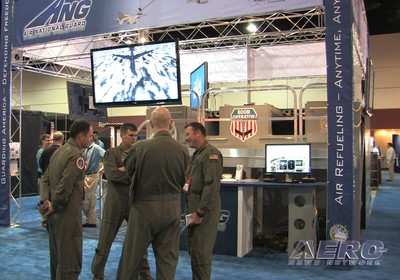
Some aircraft have been configured with the Multipoint Refueling
System or MPRS. MPRS configured aircraft are capable of refueling
two receiver aircraft simultaneously from special "pods" mounted on
the wingtips.
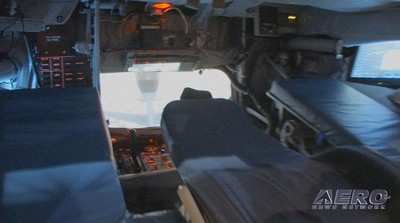
One crewmember, known as the boom operator, is stationed in the
rear of the plane and controls the boom during in-flight air
refueling. A cargo deck above the refueling system can hold a mixed
load of passengers and cargo. Depending on fuel storage
configuration, the KC-135 can carry up to 83,000 pounds of
cargo.
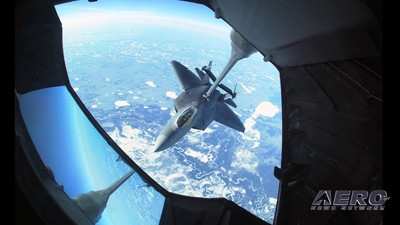
More News
Aero Linx: Transport Canada We are a federal institution, leading the Transport Canada portfolio and working with our partners. Transport Canada is responsible for transportation p>[...]
Gross Navigation Error (GNE) A lateral deviation from a cleared track, normally in excess of 25 Nautical Miles (NM). More stringent standards (for example, 10NM in some parts of th>[...]
From AirVenture 2017 (YouTube Edition): Flight-Proven Booster On Display At AirVenture… EAA AirVenture Oshkosh is known primarily as a celebration of experimental and amateu>[...]
Aircraft Parachute System (CAPS) Was Deployed About 293 Ft Above Ground Level, Which Was Too Low To Allow For Full Deployment Of The Parachute System Analysis: The day before the a>[...]
Also: 48th Annual Air Race Classic, Hot Air Balloon Fire, FAA v Banning 100LL, Complete Remote Pilot The news Piper PA-18 Super Cub owners have been waiting for has finally arrived>[...]
 ANN's Daily Aero-Linx (06.29.25)
ANN's Daily Aero-Linx (06.29.25) ANN's Daily Aero-Term (06.29.25): Gross Navigation Error (GNE)
ANN's Daily Aero-Term (06.29.25): Gross Navigation Error (GNE) Classic Aero-TV: Anticipating Futurespace - Blue Origin Visits Airventure 2017
Classic Aero-TV: Anticipating Futurespace - Blue Origin Visits Airventure 2017 NTSB Final Report: Cirrus SR22
NTSB Final Report: Cirrus SR22 Airborne Affordable Flyers 06.26.25: PA18 Upgrades, Delta Force, Rhinebeck
Airborne Affordable Flyers 06.26.25: PA18 Upgrades, Delta Force, Rhinebeck








